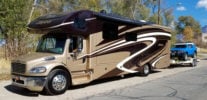 |
|
 04-10-2021, 10:03 PM
04-10-2021, 10:03 PM
|
#61
|
|
Junior Member
Join Date: Mar 2017
Location: Battleford
Posts: 21
|
Quote:
Originally Posted by ledoyle

Can you say more?
|
I believe there is a discussion earlier in the thread about hydrogen fuel cells and a pilot project in 2022 involving GM, Navistar and JB Hunt.
Ballard Power Systems has been perfecting this tech for several decades and perhaps we may actually see this in the upcoming years for heavy hauling, including RVs and/or the heavy duty trucks we use.
Hydrogen will be available liquified and will fuel up much like gas or diesel, and has the energy density roughly that of propane. So a very viable fuel, with a waste product of water.
OTOH, Musk says it will never work and they continue to release new battery technology including their non-tabbed 4680 batteries coming later this year.
Hydrogen fuel already has the energy density to power electric vehicles, while battery tech has a long ways to go to achieve that same density. Will batteries get there? Musk thinks so, but GM/Navistar/JB Hunt and others do not.
I guess time will reveal.
Brad
|

|

|
 04-11-2021, 07:37 AM
04-11-2021, 07:37 AM
|
#62
|
|
Senior Member
Join Date: Mar 2017
Location: Kingman, AZ
Posts: 1,984
|
Quote:
Originally Posted by koweb

Hydrogen will be available liquified and will fuel up much like gas or diesel, and has the energy density roughly that of propane. So a very viable fuel, with a waste product of water.
|
Sounds simple, but hydrogen is extremely dangerous, more so than gasoline. I used to deliver hydrogen gas in bulk and it has some unusual properties, like it is invisible when it burns. We used to run straw brooms along the delivery hose to make sure the connections were not on fire. It is susceptible to ambient temperature variations. Transferring from one storage container to another has be be closely monitored...going too fast will cause a sudden rise in temperature that can lead to a fire.
Liquid hydrogen is more dangerous than the gaseous hydrogen, especially when filling from one container to another. Not as simple as driving up to a pump and sticking a nozzle into a tank and pumping away. First, everything has to be physically grounded to prevent any static electricity, eye protection must be worn, and fire extinguishers have to be readily available, and the pumping process has to go slow to prevent pressure and temperature buildup in the receiving tank.
Then if there is an accident involving a ruptured tank or fuel hoses there would be a tremendous instantaneous fire. Hydrogen can self ignite if just exposed to air without an ignition source.
Producing liquid hydrogen takes specialized cryogenic plants that use a tremendous amounts of electricity, and it's expensive to transport. Just my opinions after spending 23 years in the cryogenic industry. 
__________________
Lee & Kathy, and our alarm clock Jake!
2017 Starcraft Autumn Ridge 266RKS 50 amp.
2017 Toyota Tundra Crewmax 4x4, 10-1-2021

|

|

|
 04-11-2021, 07:42 AM
04-11-2021, 07:42 AM
|
#63
|
|
Member
Join Date: Apr 2012
Location: Colorado
Posts: 66
|
Wow, thanks for the info. Guess the old adage is still true, "there ain't no free lunch"!
__________________
2007 Jayco Greyhawk 31SS
Tow 2001 Honda Accord LX V6 Automatic 4-Down
|

|

|
 04-11-2021, 08:09 AM
04-11-2021, 08:09 AM
|
#64
|
|
Junior Member
Join Date: Mar 2017
Location: Battleford
Posts: 21
|
Quote:
Originally Posted by Route 66 Traveler

Sounds simple, but hydrogen is extremely dangerous, more so than gasoline. I used to deliver hydrogen gas in bulk and it has some unusual properties, like it is invisible when it burns. We used to run straw brooms along the delivery hose to make sure the connections were not on fire. It is susceptible to ambient temperature variations. Transferring from one storage container to another has be be closely monitored...going too fast will cause a sudden rise in temperature that can lead to a fire.
Liquid hydrogen is more dangerous than the gaseous hydrogen, especially when filling from one container to another. Not as simple as driving up to a pump and sticking a nozzle into a tank and pumping away. First, everything has to be physically grounded to prevent any static electricity, eye protection must be worn, and fire extinguishers have to be readily available, and the pumping process has to go slow to prevent pressure and temperature buildup in the receiving tank.
Then if there is an accident involving a ruptured tank or fuel hoses there would be a tremendous instantaneous fire. Hydrogen can self ignite if just exposed to air without an ignition source.
Producing liquid hydrogen takes specialized cryogenic plants that use a tremendous amounts of electricity, and it's expensive to transport. Just my opinions after spending 23 years in the cryogenic industry.  |
Thanks Lee, I appreciate you sharing your experience!
As others have pointed out, EVs have been around longer than ICE, but we still talk about heavy hauling EVs as in the future, requiring new technologies not yet deployed en masse. There are a lot of reasons why hydrogen has been in the development stage for so long, and you've pointed out a few of them.
The biggest thing that is different now, to me, is the amount of government interest (specifically money and regulatory forcing). I suspect we will see rapid development and it will be an exciting decade of change. I wouldn't bet my entire future on green energy, but I also have been making changes to our business in the past 3 years because I didn't want to keep betting my future on the oil and gas industry either.
Great discussion, thanks again,
Brad
|

|

|
 04-11-2021, 06:40 PM
04-11-2021, 06:40 PM
|
#65
|
|
Senior Member
Join Date: Sep 2011
Location: Lake City, MI summer, FL winter
Posts: 143
|
Hard to foresee what the EVs will evolve to.
Many of us remember the first electric drills, they were powerless, quickly drained, and it took a while to charge the internal battery. A contractor wouldn't be caught dead with one.
Now, with plug and play battery packs, you don't see a contractor without one.
Maybe trucks of the future will have battery packs instead of diesel tanks, that are lifted out and replaced faster than filling up diesel. Who knows......
__________________
'07 Chevy Druamax LBZ
2017 Jay Flight 21QB
2012 Jay Flight 19RD (sold)

|

|

|
 04-12-2021, 06:50 AM
04-12-2021, 06:50 AM
|
#66
|
|
Senior Member
Join Date: May 2013
Location: Gurnee, IL
Posts: 1,307
|
Quote:
Originally Posted by koweb

Electric vehicles do not necessarily need batteries. I'm not sure why people automatically assume they do 
Brad |
I'd be interested to understand what you mean here. The technology exists to charge a cell phone without plugging it in. It's on some sort of pad. I wonder if that would be possible to embed that type of pad in the road so we could draw power while moving? No idea if that would work, but it would be pretty cool. Are you referring to something like this?
__________________
Scott, DW, and Identical Twin DS (12)
2022 Chevrolet Silverado 1500 LTZ Crew Cab 3.0L Duramax 4WD
2019 Jayco Jay Flight SLX 298BH
2013 Jayco Jay 1206 (Sold)

|

|

|
 04-12-2021, 08:07 AM
04-12-2021, 08:07 AM
|
#67
|
|
Junior Member
Join Date: Mar 2017
Location: Battleford
Posts: 21
|
Quote:
Originally Posted by Scott

I'd be interested to understand what you mean here. The technology exists to charge a cell phone without plugging it in. It's on some sort of pad. I wonder if that would be possible to embed that type of pad in the road so we could draw power while moving? No idea if that would work, but it would be pretty cool. Are you referring to something like this?
|
Hydrogen fuel cells, discussed earlier, is the most promising and will go into trials next year for long haul trucking.
There are a number of other technologies being researched including super capacitors and even powered roads. Some of these sound very futuristic, but again I think given the huge shift around the world by governments to fund "green" initiatives (and penalize fossil fuels, ala carbon taxes), we may see some things come to market much quicker than we might expect.
Brad
|

|

|
 04-12-2021, 10:36 AM
04-12-2021, 10:36 AM
|
#68
|
|
Senior Member
Join Date: Aug 2018
Location: Atlanta
Posts: 514
|
I'm in the process of developing a new methane gas powered RV. While it will be extremely energy efficient, it will require you to take 2 politicians along on your trip that will explain their platforms into tubes that will feed directly into the engine. Please note, however, that you may become drowsy if you pay attention to the fueling process...
__________________
2019 Entegra Odyssey 31L
|

|

|
 04-12-2021, 10:46 AM
04-12-2021, 10:46 AM
|
#69
|
|
Senior Member
Join Date: Jun 2016
Location: Denver
Posts: 4,248
|
Quote:
Originally Posted by Finally Able

I think the transition to EVs and away from fossil fuels is *both* a national desire (granted, not universally among my Boomer peers, but certainly among those of my childrens' age (33 to 42), and a necessity.
|
I agree.
We Boomer's aren't the target audience as we'll pooh-pooh anything that looks slightly different.
"Pay for TV?? Why? I've got three channels right here for free!"
"More than ONE PHONE in the house?? Heavens! Who needs more than one phone?"
"A computer? In the house? Why?"
"You're sending someone a message on the phone? Just call them!!!"
"Internet? Bah ain't nothing but p*rn on there! Worthless!!!"
And so on, and so on... 
__________________
2016 Greyhawk 31FK
|

|

|
 04-12-2021, 01:21 PM
04-12-2021, 01:21 PM
|
#70
|
|
Senior Member
Join Date: May 2013
Location: Gurnee, IL
Posts: 1,307
|
Quote:
Originally Posted by koweb

Hydrogen fuel cells, discussed earlier, is the most promising and will go into trials next year for long haul trucking.
There are a number of other technologies being researched including super capacitors and even powered roads. Some of these sound very futuristic, but again I think given the huge shift around the world by governments to fund "green" initiatives (and penalize fossil fuels, ala carbon taxes), we may see some things come to market much quicker than we might expect.
Brad
|
Brad,
Thanks for clearing that up.
__________________
Scott, DW, and Identical Twin DS (12)
2022 Chevrolet Silverado 1500 LTZ Crew Cab 3.0L Duramax 4WD
2019 Jayco Jay Flight SLX 298BH
2013 Jayco Jay 1206 (Sold)

|

|

|
 04-12-2021, 02:33 PM
04-12-2021, 02:33 PM
|
#71
|
|
Senior Member
Join Date: Apr 2016
Location: Kingman AZ and where our Seneca is today.
Posts: 3,118
|
I look at this from a physics perspective...
It takes a specific amount of energy to move a specific object. More energy to move it if it is heavier and taking into consideration rolling resistance, wind resistance and how efficient the system is. Energy is measured in different methods, but can be converted from Joules to BTU and others.
Converting energy also results in losses, as in the heat lost in converting diesel to propel a truck. Electric motors also give off heat in propulsion of a vehicle, but at a different rate.
Storing energy is the biggest challenge for electric vehicles. The new Peterbuilt 579ev can store almost 400kWh and require nearly 4 hours to charge.
If you were to compare that with the diesel version, 440kWh of electricity is nearly equal to 11 gallons of diesel, when converted to btu (1kwh = 3,412Btu and 1g of diesel = 137,000Btu) So when you compare a full tank of electricity, it is only equal to 11gallons of diesel energy.
__________________
Steve & Stacy with Jasper (Australian Cattle dog)
2015 Seneca 36FK
Custom 27' flatbed trailer hauling:
07 Toyota FJC & Yamaha Kodiak 400 ATV

|

|

|
 04-12-2021, 03:06 PM
04-12-2021, 03:06 PM
|
#72
|
|
Junior Member
Join Date: Mar 2017
Location: Battleford
Posts: 21
|
Quote:
Originally Posted by SloPoke

I look at this from a physics perspective...
It takes a specific amount of energy to move a specific object. More energy to move it if it is heavier and taking into consideration rolling resistance, wind resistance and how efficient the system is. Energy is measured in different methods, but can be converted from Joules to BTU and others.
Converting energy also results in losses, as in the heat lost in converting diesel to propel a truck. Electric motors also give off heat in propulsion of a vehicle, but at a different rate.
Storing energy is the biggest challenge for electric vehicles. The new Peterbuilt 579ev can store almost 400kWh and require nearly 4 hours to charge.
If you were to compare that with the diesel version, 440kWh of electricity is nearly equal to 11 gallons of diesel, when converted to btu (1kwh = 3,412Btu and 1g of diesel = 137,000Btu) So when you compare a full tank of electricity, it is only equal to 11gallons of diesel energy.
|
Yes, that's a great way to present the math. Now, there is an argument the electric motor is multiples more efficient than an ICE, but even so the energy density of batteries is absolutely the limiting factor in EVs, especially larger ones that need to haul heavy loads.
Sorry, can't quickly find it here, but somewhere at a few hundred kWh of battery there becomes a diminished return where the extra weight of increased battery capacity no longer increases range (the curve is not linear).
So, where a daycab, local hauler, like the Peterbuilt above may (barely) function with batteries, it seems that long haulers would need far higher energy storage densities than batteries can provide. Which is again where GM/Navistar/JB Hunt are going down the road of a massive investment in hydrogen fuel cells and the fuel station infrastructure. (hydrogen being the energy source and much closer in density to fossil fuels)
The short answer is that long haul trucking and long haul RVing are 2 areas that do not have a viable solution in place today. Nor do any potential solutions being brought to market look promising enough, yet.
Will battery technology improvements and solar panel efficiency be the ultimate solution? Or will it be hydrogen fuel cells? Or some other technology that none of us has heard of yet?
Brad
|

|

|
 04-12-2021, 03:15 PM
04-12-2021, 03:15 PM
|
#73
|
|
Senior Member
Join Date: Mar 2017
Location: Kingman, AZ
Posts: 1,984
|
__________________
Lee & Kathy, and our alarm clock Jake!
2017 Starcraft Autumn Ridge 266RKS 50 amp.
2017 Toyota Tundra Crewmax 4x4, 10-1-2021

|

|

|
 04-12-2021, 03:29 PM
04-12-2021, 03:29 PM
|
#74
|
|
Senior Member
Join Date: Dec 2018
Location: Owens Cross Roads
Posts: 3,223
|
And they dried poop makes a great fuel source. Burns well.
|

|

|
 04-12-2021, 09:12 PM
04-12-2021, 09:12 PM
|
#75
|
|
Senior Member
Join Date: Apr 2016
Location: Kingman AZ and where our Seneca is today.
Posts: 3,118
|
Quote:
Originally Posted by koweb

Yes, that's a great way to present the math. .......
The short answer is that long haul trucking and long haul RVing are 2 areas that do not have a viable solution in place today. Nor do any potential solutions being brought to market look promising enough, yet.
Will battery technology improvements and solar panel efficiency be the ultimate solution? Or will it be hydrogen fuel cells? Or some other technology that none of us has heard of yet?
Brad
|
One thing I notice... there is very little technical detail on the specifications of the Hydrogen fuel cells available today. It is mostly theory mixed with opinion of what it can be capable of in a commercial setting. Then... What happens to Hydrogen production if Steam Reforming is on the decline due to the Green new deals proposed reduction and eventual elimination of Natural Gas?
__________________
Steve & Stacy with Jasper (Australian Cattle dog)
2015 Seneca 36FK
Custom 27' flatbed trailer hauling:
07 Toyota FJC & Yamaha Kodiak 400 ATV

|

|

|
 04-12-2021, 09:36 PM
04-12-2021, 09:36 PM
|
#76
|
|
Senior Member
Join Date: Dec 2018
Location: Owens Cross Roads
Posts: 3,223
|
No telling what patents the car manufacturers have bought up over the years to protect their internal combustion engine market.
|

|

|
 04-12-2021, 11:45 PM
04-12-2021, 11:45 PM
|
#77
|
|
Member
Join Date: Mar 2021
Location: Pearland
Posts: 50
|
The road to Hell is paved with good intentions. Mercury outboards was testing aluminum Cadillac fuel injected V8 engines before Yamaha could sell their products here because of emissions, that never happened. Helen Wait will have the answer first.
|

|

|
 |
|
 Posting Rules
Posting Rules
|
You may not post new threads
You may not post replies
You may not post attachments
You may not edit your posts
HTML code is Off
|
|
|
|
 » Recent Threads
» Recent Threads |
|
|
|
|
|
|
|
|
|
|
|
|
|
|
|
|
|
|
|
|
|
|
|
|
|
|
|
|
|
|
|
|
|
|
|
|
|
|
|
|
|